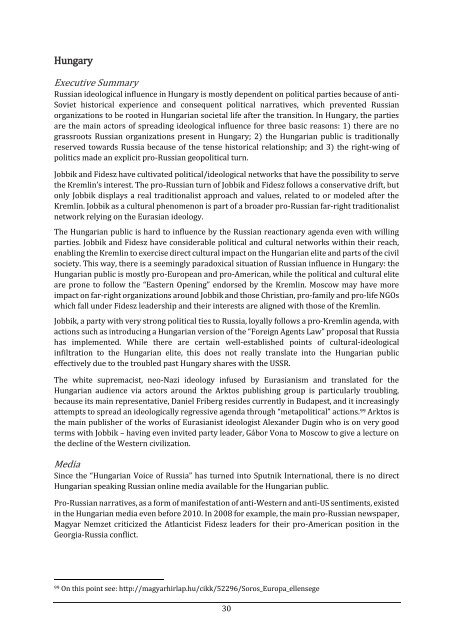to Central Europe
PC_reactionary_values_CEE_20160727
PC_reactionary_values_CEE_20160727
Create successful ePaper yourself
Turn your PDF publications into a flip-book with our unique Google optimized e-Paper software.
Hungary<br />
Executive Summary<br />
Russian ideological influence in Hungary is mostly dependent on political parties because of anti-<br />
Soviet his<strong>to</strong>rical experience and consequent political narratives, which prevented Russian<br />
organizations <strong>to</strong> be rooted in Hungarian societal life after the transition. In Hungary, the parties<br />
are the main ac<strong>to</strong>rs of spreading ideological influence for three basic reasons: 1) there are no<br />
grassroots Russian organizations present in Hungary; 2) the Hungarian public is traditionally<br />
reserved <strong>to</strong>wards Russia because of the tense his<strong>to</strong>rical relationship; and 3) the right-wing of<br />
politics made an explicit pro-Russian geopolitical turn.<br />
Jobbik and Fidesz have cultivated political/ideological networks that have the possibility <strong>to</strong> serve<br />
the Kremlin’s interest. The pro-Russian turn of Jobbik and Fidesz follows a conservative drift, but<br />
only Jobbik displays a real traditionalist approach and values, related <strong>to</strong> or modeled after the<br />
Kremlin. Jobbik as a cultural phenomenon is part of a broader pro-Russian far-right traditionalist<br />
network relying on the Eurasian ideology.<br />
The Hungarian public is hard <strong>to</strong> influence by the Russian reactionary agenda even with willing<br />
parties. Jobbik and Fidesz have considerable political and cultural networks within their reach,<br />
enabling the Kremlin <strong>to</strong> exercise direct cultural impact on the Hungarian elite and parts of the civil<br />
society. This way, there is a seemingly paradoxical situation of Russian influence in Hungary: the<br />
Hungarian public is mostly pro-<strong>Europe</strong>an and pro-American, while the political and cultural elite<br />
are prone <strong>to</strong> follow the “Eastern Opening” endorsed by the Kremlin. Moscow may have more<br />
impact on far-right organizations around Jobbik and those Christian, pro-family and pro-life NGOs<br />
which fall under Fidesz leadership and their interests are aligned with those of the Kremlin.<br />
Jobbik, a party with very strong political ties <strong>to</strong> Russia, loyally follows a pro-Kremlin agenda, with<br />
actions such as introducing a Hungarian version of the “Foreign Agents Law” proposal that Russia<br />
has implemented. While there are certain well-established points of cultural-ideological<br />
infiltration <strong>to</strong> the Hungarian elite, this does not really translate in<strong>to</strong> the Hungarian public<br />
effectively due <strong>to</strong> the troubled past Hungary shares with the USSR.<br />
The white supremacist, neo-Nazi ideology infused by Eurasianism and translated for the<br />
Hungarian audience via ac<strong>to</strong>rs around the Ark<strong>to</strong>s publishing group is particularly troubling,<br />
because its main representative, Daniel Friberg resides currently in Budapest, and it increasingly<br />
attempts <strong>to</strong> spread an ideologically regressive agenda through “metapolitical” actions. 99 Ark<strong>to</strong>s is<br />
the main publisher of the works of Eurasianist ideologist Alexander Dugin who is on very good<br />
terms with Jobbik – having even invited party leader, Gábor Vona <strong>to</strong> Moscow <strong>to</strong> give a lecture on<br />
the decline of the Western civilization.<br />
Media<br />
Since the “Hungarian Voice of Russia” has turned in<strong>to</strong> Sputnik International, there is no direct<br />
Hungarian speaking Russian online media available for the Hungarian public.<br />
Pro-Russian narratives, as a form of manifestation of anti-Western and anti-US sentiments, existed<br />
in the Hungarian media even before 2010. In 2008 for example, the main pro-Russian newspaper,<br />
Magyar Nemzet criticized the Atlanticist Fidesz leaders for their pro-American position in the<br />
Georgia-Russia conflict.<br />
99 On this point see: http://magyarhirlap.hu/cikk/52296/Soros_Europa_ellensege<br />
30


